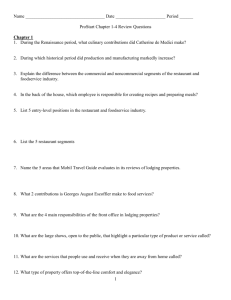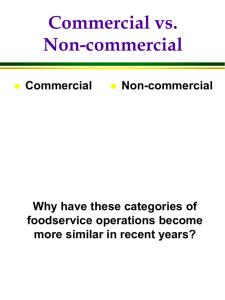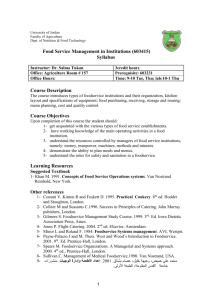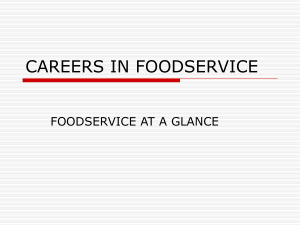Types of Restaurants
advertisement
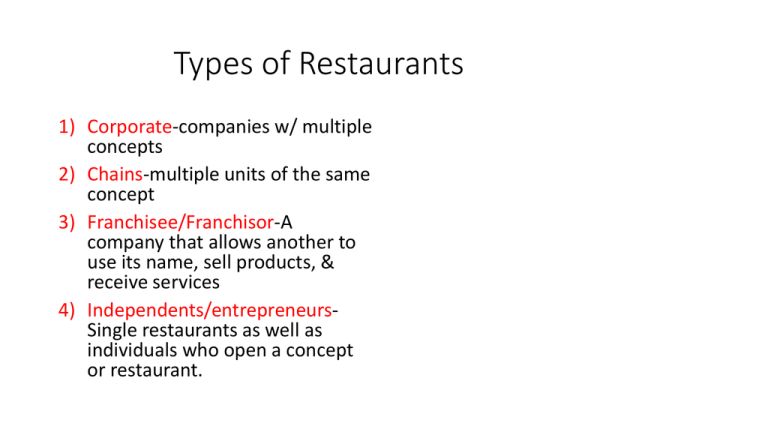
Types of Restaurants 1) Corporate-companies w/ multiple concepts 2) Chains-multiple units of the same concept 3) Franchisee/Franchisor-A company that allows another to use its name, sell products, & receive services 4) Independents/entrepreneursSingle restaurants as well as individuals who open a concept or restaurant. Food Service Ratings • Zagat Survey – consumer based guide that rates restaurants on 4 qualities. 1) Food 2) Décor 3) Service 4) Cost Each area rated on a 30 pt scale. Based on a survey from many people. Available on internet & book. • Michelin Guide – Better known in Europe but used here too. Rating based on this: • Quality, Mastery of flavors, cooking mastery, personality of cuisine, value for the price, consistency. - 1 star – very Good - 2 Star-Excellent - 3 star-pinnacle of exceptional cuisine. Very hard to get!! Career in the Hospitality Industry Advantages Challenges • Abundance of Jobs- 2nd largest employer • Advancement Opportunitiespeople advance more quickly in hospitality • Fast pace & variety!! • Meeting new people every day • Travel • Provides services to people & can be demanding. • “Round-the-clock industry • Hours of work-nights, weekends, holidays • Stress-fast paced career • Working conditions – no air • Relocation Segments of the Hospitality Industry • Catering-provides opportunity for creativity in menu selection & style of service. Wide range of opportunities from private homes, corporate events, golf tournaments, weddings,etc. No 2 events are the same. • Retail-Businesses that offer home meal replacements & ready-made dishes. Restaurants in department stores or take-out sections of grocery stores are examples (Publix) • Stadiums-a sports arena. Up to 8,000 people needing foodservice. Has servers, walking vendors, cooks, cashiers, corporate suites w high-end food. Usually a contract feeder. Segments Continued • Convention Centers- A gathering of people who have something in common. Expositions-Large shows, open to the public, that highlight a particular type of product or service. (Gun show) Trade showrestricted to those involved in the industry being featured. Manufacturers rent space at trade shows to exhibit, advertise, and demonstrate their product or service to people interested in that field. The NRA show is 1 of the larges conventions in the world in any profession. • National & State Parks-Many parks offer accommodations from campgrounds to hotels, restaurants, and recreational facilities. Segments Continued • Theme Parks-Impacts all hospitality industries such as foodservice, lodging,& transportation. They impact local economies & job markets of the areas they are located. • Shopping-Malls and outlet malls attract tourists as a recreation. Many foodservice opportunities in malls. Quick-service & casual-dining. The Mall of America has 500 stores, 20 sit-down restuaraunts, 30 fast food. Big outlet centers attract tourists. Some large dept stores offer foodservice. Target has Starbucks, etc. • Monuments, museums,& Zoos- More than half of art museums have sit-down restaurants (BMA). Zoos & monuments offer foodservice & concessions. Segments continued • Health Services- boom in foodservice opportunities in hospitals, long-term care facilities, & assisted living facilities. • Schools & Universities-Commissary/satellite feeding uses a kitchen prepared at one place & ships it to another location to be served. • Military-More than 1 million means are prepared in military kitchens each day. Must focus on nutrition. • Corrections-Preparing food at minimal cost. Both contract feeding & staff employed directly by the institutions which offer competitive wages at management level. • Lodging-Wide range of opportunities. Many luxury hotels have awardwinning, fine-dining operations. Other properties have coffee carts to buffets to full-service operations. Career Pathways Front of the House Back of the House • Employees serve guests directly. Includes managers, banquet managers, dining room managers, matire d’s, hosts/hostesses, cashiers, bar staff, serving staff, & busers. • Employees work outside the public space. Includes line cooks, pastry chefs, dishwashers, bookkeepers, storeroom clerks, purchasers, dieticians, and menu planners. (chefs table & exhibition kitchen) Entry Level Jobs One that requires little or no previous experience. Lead to other positions with more responsibility. Foodservice industry offers more entry-level jobs and generates more new jobs than any other service industry. • Host/hostess/cashier: The 1st impression guests receive. Take reservations, greet & seat customers, assist w coats, take reservations, answer questions such as hours of operations, menu questions, etc. May be the cashier too. • Quick-service counter servers: Greets customers, takes order, takes money, etc. (McDonald's) Only has a few minutes to make good impression on customer. • Buser-Assists the server & takes care of guests’ needs. Responsible for clearing & grooming the table. Entry level jobs cont. • Prep cooks – help more experienced cooks & chef prepare & cook guests’ orders. Often portion out food, precook it, or get it ready to assemble for the more experienced cooks to finish when guests arrive. • Dishwasher-Clean, sparkling, sanitary tableware is essential. Washes dishes and keeps an eye on service areas to make sure supplies do not run out. Careers in Restaurant & Foodservice, Lodging, Travel, and Tourism Restaurant & Foodservice Careers • Owner/Operators & Entrepreneurs-own & run own businesses. Well Must be well organized & willing to work long hours. • General Managers-responsible for planning, direction, & coordination of operation. Hiring, firing, & day-to-day operation of business. • Managers-Divided into categories within an operation such as catering, beverage, kitchen, & dining room. Hiring & supervising employees, staff training, keeping food safe, marketing, managing costs, etc. • Assistant Managers-Help the managers. Train to be a manager. • Executive chef-oversees entire kitchen. Purchasing,schedules, decides menu items. • Sous chef-responsible for kitchen team and manages overall food production. • Banquet chef-responsible for catered parties. Usually work in lodging operations & clubs. • Pastry chefs – Responsible for pastry & baking production in an operation. Most work in hotels, fine-dining restaurants, & restaurants with high volumes of customers. • Station Cooks – responsible for a variety of areas within a kitchen. The pantry or garde manger cook is responsible for cold food and buffet arrangements. The roast cooks prepares meat, poultry, and fish. The sauce cook prepares sauces and stocks. The vegetable cook prepares veggies and soups. • Food writers – Need strong communication skills to write books, magazine articles, & brochures, providing consumers w information about food & related matters. • Food stylists – arrange food attractively for photographs to be included in magazines, brochures, etc • Foodservice Marketers- active in sales, management, & distribution of food products & services. A huge amount of food & products must be marketed & sold to foodservice operators. • Research & development chefs-development & testing of new products in test kitchens & labs. Marketing & promotion can also be a part of it. • Food Scientists-Study the composition of food. Develop new food products as well as new ways to process & package them. Test food for quality, purity, & safety to make sure they meet government standards. • Nutritionists & dieticians-trained in food & nutrition. Help people make wise food choices and develop special diets. Dieticians usually work in universities, restaurants, schools, hospitals, cafeterias. • Food Production & Food Processing-Includes everything from running a food manufacturing & processing facility to distributing food products to restaurants. Requires a large network of people. • Accountants/controllers-Knowledgeable about trends in industry, give financial advice, & handle payroll & financial procedures. • Trainers – Conduct raining sessions for groups of employees or managers. Usually work for large restaurant & foodservice companies that own many units. Must give employees & managers the right training for their jobs. • Retail Food Managers – Should know how to prepare food, understand & apply food safety standards, & promote what they have to their customers. This area is growing rapidly. • Foodservice & hospitality educators-Needed at many levels. Most work in industry & move into educator positions. Careers in Lodging Divided into those with customer contact and those that support the running of the operation • General Management – Responsible for overall planning,direction, & coordinating of the operation. Hiring, firing, & promoting. Leave day to day functions to managers who report back to them. • Accounting & Financial management – Keep track of overall profits record sales, & calculate costs. • Human resources – Recruit, select, & train qualified applicants and evaluate performance. Must administer federal, state, and local labor laws and oversee benefits program. • Marketing & Sales – Generate the property’s sales. Make sure facility & services are well suited to customers needs. • Front office – the “nerve center” represents what a lodging establishment is to most guests. Must have good people skills & offer quality service. • Housekeeping – Maintain property, clean rooms for guests. • Security – A lodging facility may employ a number of security personnel, including a director, watchmen, guards, & detectives. • Food & beverage – Good people skills and a commitment to quality. Oversees the kitchen, dining room, lounge, banquet rooms, & room service. Supervises & schedules employees, monitors product cost control, & composing menus. • Concierge – Employed by hotels, motels, and resorts, the concierge serves guests by helping them buy tickets to shows and events, answering questions, booking restaurant reservations, & more. Careers in Travel & Tourism: Transportation All methods of travel. Many of these companies must employ drivers, ticket agents, mechanics, engineers, managers, & other adminstrators. Transportation Careers • Travel Agent – Helping travelers with all of their arrangements. Make airline reservations, plan trips, set itineraries, excursions, etc. • Corporate Travel Office Employees – Large companies employ their own inhouse travel services. These employees make travel arrangement for their employees business trips. • Airline careers – Offers many jobs from flight attendant, reservations agent, ticken agent, pilot, mechanic, & baggage handler. • Trains – conductors, engineers, & ticket agents. Many stations have restaurant & foodservice operations. • Cruise ships – Many ships have as many as 1,000 employees on board from chefs to engineers to entertainers. • Charter Services – Private companies offer specific traveling arrangements for groups or individuals. Opportunities include private aviation and bus charters, among others. • Buses, limousines, and cars – Drivers of all types are an important part of this segment. Includes private aviation and bus charters, among others. Rental car companies also included. Tourism Careers • Tour Guide - Many tour guides lead trips that appeal to niche markets, or groups of people having similar interests, ages, or skills,, and common travel objectives. • Tourism Office Employees – Established by state & local governments and provide information to people who are visiting or who would like to visit an area. They answer questions, create marketing & advertising campaigns, & collect statistics on travelers. • Convention & meeting planners – Needed to see the countless arrangements & details that go into large meetings & conventions. Invite speakers, arrange meeting rooms, hire video producers, etc. • Travel writers & photographers – Most newspapers & many magazines and journals carry travel-related stories. These people provide the words & photos for those stories. Many travel firms & tour companies also employ writers & photographers to create promotional materials. • Theme park & amusement park employees – Can employ hundreds or sometimes thousands of people. Disney employs thousands of people in management, accounting, administrative, & entertainment positions. • National Park Service – Park Rangers, archaeologists, firefighters, restaurant & foodservice managers, and many administrative positions.
